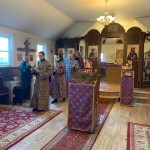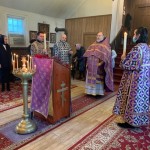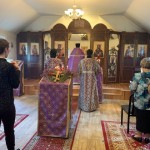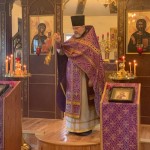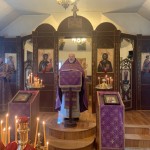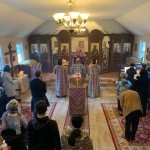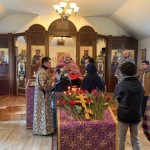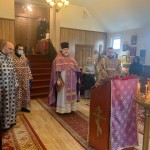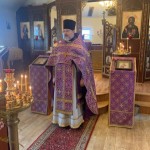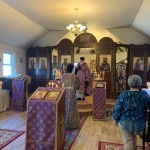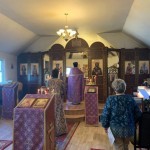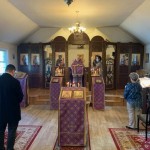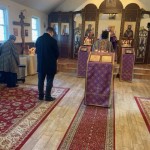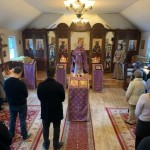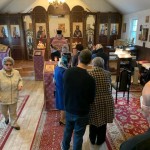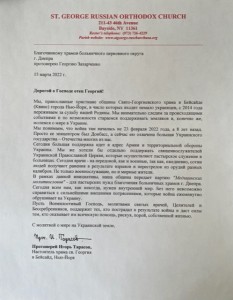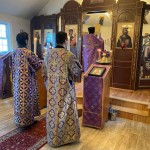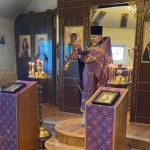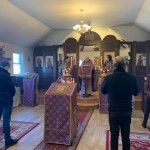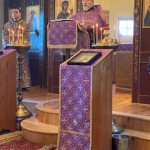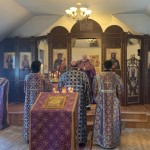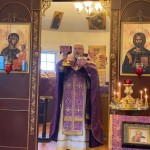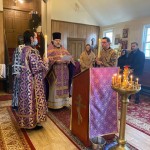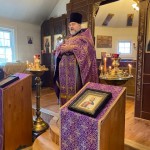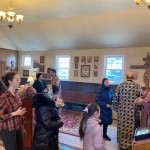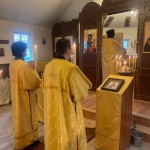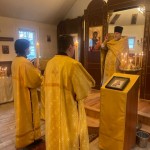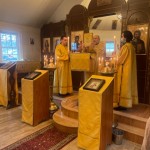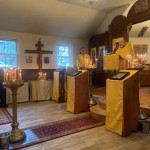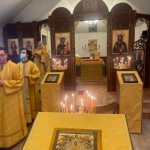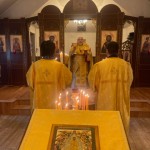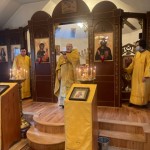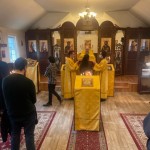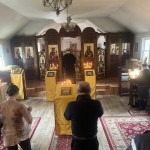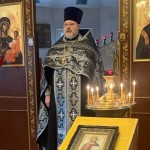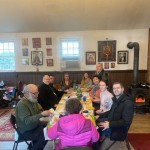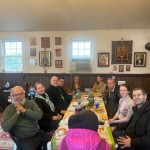On March 27, on the Third Sunday of Lent we had a nice celebration at St. George Church. On that Sunday the Orthodox Church venerates the Holy Cross.
Before the reading of the Hours the Rector, Archpriest Igor Tarasov solemnly transferred the cross from the altar to the middle of the church and placed it on the stand.
Following the Hours the Rector served the Divine Liturgy of St. Basil the Great. After the Gospel lesson he preached the following homily:
“Today we approached the middle of our Lenten journey towards the Holy Passions and Resurrection of our Lord. On this Third Sunday of Lent we venerate the Holy Cross, the precious and life-giving tool of our salvation. In today’s Gospel reading we heard the words of Christ, “Whoever desires to come after Me, let him deny himself, and take up his cross, and follow Me” (Mk. 8, 34). These words mean that every journey of a man to the true God and every way to man’s salvation is the way of the Cross”.
“We know that our Lord Jesus Christ had to make His way of the Cross when He was condemned to death. There was no other way to save the human kind. In the same fashion, there is no other way for us to attain blessed eternity if we do not take up our own crosses and if we do not follow the Lord. But again, thinking of the Lord we recall that after the painful way of the Cross, after the terrible crucifixion, after the death on the Cross, there came glorious and radiant Resurrection of our Lord. Without the Cross there was no Resurrection. This is why today we sing, “Before Thy Cross we bow down in worship, o Master, and Thy Holy Resurrection we glorify”. In the same way, without our own crosses there won’t be for us eternal blessedness with the risen Lord”.
“Thinking of the things necessary for salvation, we recall that the first condition for a man to be saved is to receive Baptism. The Lord made it clear saying, “He who believes and is baptized will be saved; but he who does not believe will be condemned” (Mk. 16, 16). But another necessary thing to be saved is to carry the cross. According to Ven. Ephrem the Syrian this the “second Baptism”. He wrote, “Two baptisms are necessary for the righteous and for the sinners, and one cannot save without another”. Our “second Baptism”, according to St. Ephrem is our sufferings for Christ, our confession of Christ, our life in Christ. This why we heard in today’s Gospel lesson, “Whoever is ashamed of Me and My words in this adulterous and sinful generation, of him the Son of Man also will be ashamed when He comes in the glory of His Father with the holy angels” (Mk. 8, 38). Thus, not just being baptized and formally declare our faith in Jesus Christ, but a true life in Christ, true confession of Him before other men, before “sinful and adulterous generation” is a condition for our salvation”.
“Throughout the whole history of Christianity those who truly followed the Lord were persecuted. Those persecutions were different but they always took place. Nowadays they are done in many ways. Not long ago there were fierce persecutions of the Christian people in the Middle East where our brethren in faith were murdered, tortured and killed all the time. Nowadays those Christians are still in danger. But, on the other hand, many other forms of persecution are being employed against us. The war in Ukraine is one of the examples of such persecution, although it is indirect. But still, the churches are being destroyed and people who are baptized, Orthodox people, suffer great afflictions and dangers. In addition, in the whole world there exists a modern-day heresy of worshiping man. It is a cult of man along with his sins and deviations. It is an idea that the society has to serve man and his desires without serving God. And who does not wish to adhere to this heresy is being persecuted”.
“Dear brothers and sisters! The Lord said, “In the world you willhave tribulation; but be of good cheer, I have overcome the world.” (Jn. 16, 33). Let us then be of good cheer!Let us be courageous and not become frightened by those persecutions for after the Cross always comes holy Resurrection. Let us then confess our Lord without being ashamed of Him in this sinful and adulterous generation. Let us take up our cross and follow Christ. Let us follow Him into blessed eternity!”
The choir prayerfully performed the hymns dedicated to the Holy Cross during preparation for Holy Communion.
Following the dismissal of the Liturgy the Rector and the altar servers came out of the sanctuary before the stand in the middle of the church and venerated the Precious Cross.

